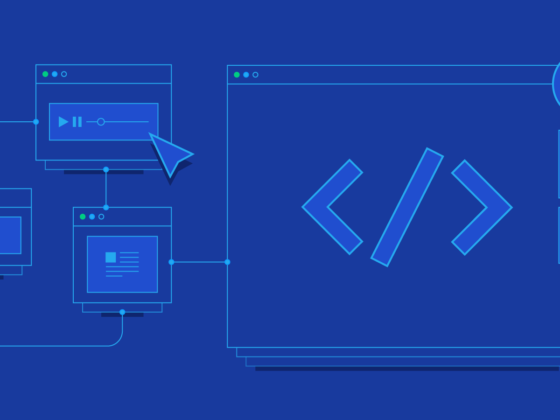If you study computer science or take a course to become a software engineer, you’ll need some software developer skills to become a good programmer.
Technology is vast, and many new tools, platforms, and languages have arisen lately. It doesn’t matter if you’re a seasoned or novice programmer; as a modern software developer, you should understand how to incorporate modern technologies and other technical aspects into your work to create a quality product or software.
In this article, we’ll go over critical skills you should have as a software developer or if willing to become one. Below you’ll find a list of 10 technical skills you can learn.
What are software developer skills?
Software developer skills are technical abilities that a specialist learns to create successful programs and applications. They usually entail writing source code, the sequence of words and symbols that allow a program to function, using mathematical knowledge and problem-solving skills.
Digital tools and computer systems are just two examples of skills to learn. Many software developers learn them in classes as part of a computer science degree program or a certification program.
Developer Skills Matrix
The software developer skills matrix is a table that lists the skills expected of a junior, middle and senior developer in different categories. It is a handy tool because it shows at a glance what level of skill is expected in each category. Also, you can easily evaluate your skills and compare them to the expectations.
According to the matrix below, there are 5 classes of coding skills:
- Programming
- Computer Science
- Software Engineering
- Experience
- Knowledge
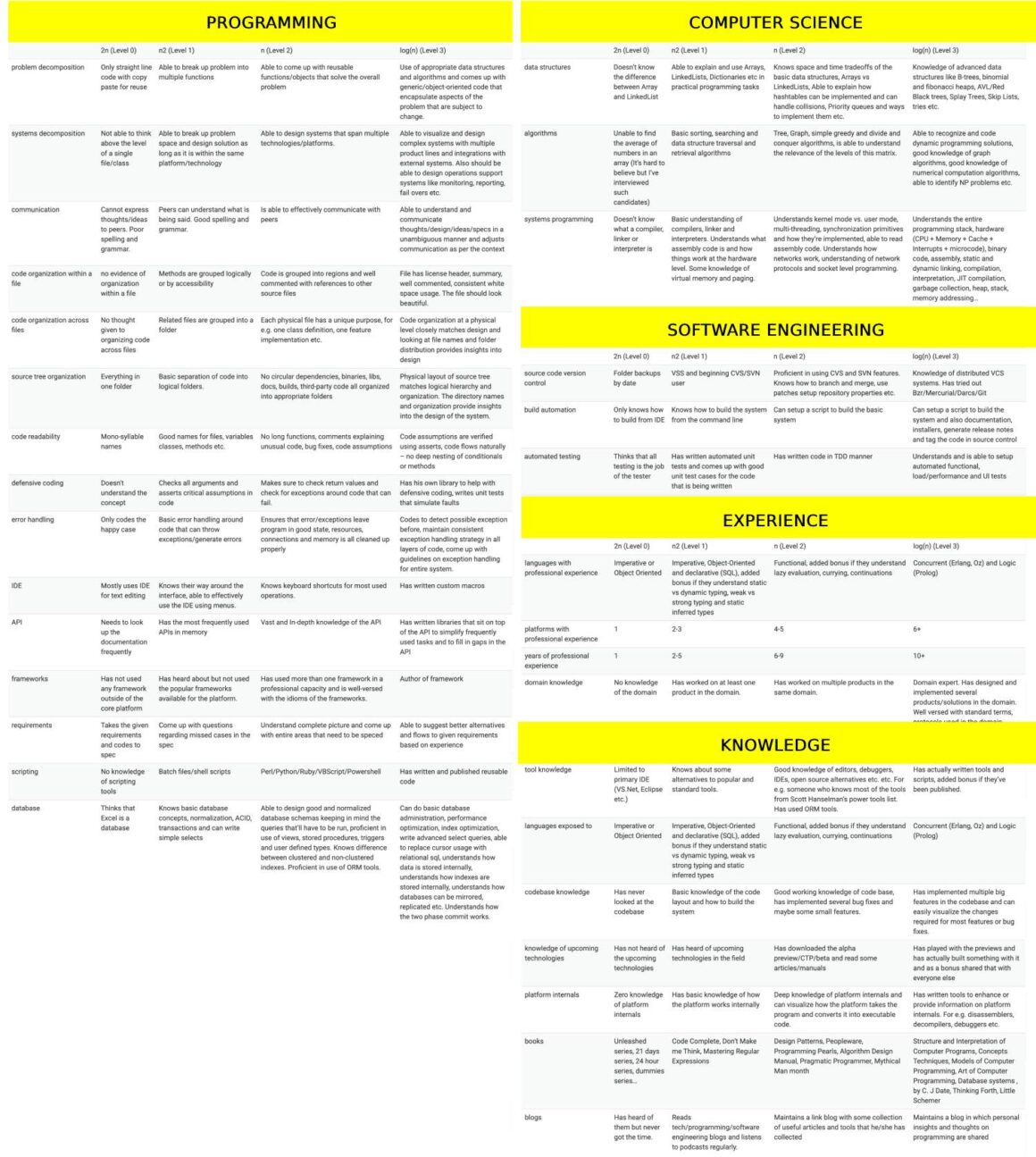
Click here to download a full PDF with a software developer content matrix in full resolution.
Looking for a school that gives the right skills?
Get matched with an award-wining coding school to start your coding career now:
Top 10 skills for a software developer
Without further ado, here is a list of skills that we believe every programmer should possess regardless of their job. These are crucial abilities that will benefit you for a long time. Any time, money, or effort put into this will help you reap the benefits throughout your career.
1. Programming languages

This item is obvious but indispensable. Different programming languages, high-level and low-level, exist for writing software code. Software developers should specialize in at least one programming language to increase their job opportunities, as hiring managers often expect candidates to have expertise. Choose a language based on your interests. Some options may better suit mobile app development, while others may better suit game design.
Here go some popular programming languages to learn:
- JavaScript: When a user clicks on a button, JavaScript helps developers design an interactive website application system.
- HTML: Use this standard to display text and image content on a website, such as paragraphs, lists, and charts.
- CSS: This option allows you to add fonts, colors, and spacing to text on a website. As a result, many developers know both HTML and CSS.
- Python: This option is a multi-faceted programming language that allows you to write code for entire programs or track language errors. Its structure is simple, making it easier to learn.
- C++: This programming language can help you create software that optimizes hardware capabilities. For complex gaming systems with high-quality graphics, many game developers use C++.
- Java: This language allows you to create programs that run on multiple computers. Java is used to create high-quality video games because it is similar to C++ but simpler.
Related guide: Top 10 Programming Languages to Learn in 2022
2. Data structures and algorithms
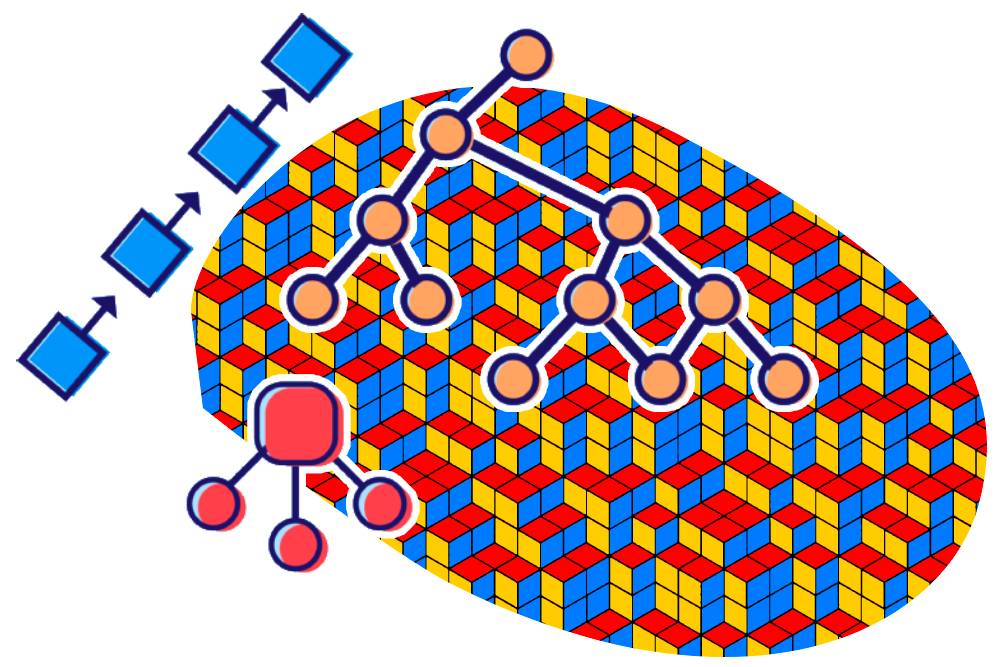
Most companies place a high priority on this skill when evaluating problem-solving and coding abilities. If you understand the principles of data organization and usage to solve a real-world problem, you can become a good software developer.
Whether you’re a developer, a student of computer science, or a self-taught programmer, you should make a concerted effort to learn Data Structures and Algorithms. Algorithms and data structures are at the heart of programming. Most developers are unaware of its importance at first, but once you begin your career in software development, you will notice that your code is either too long or takes up too much space. There, you’ll see how important it is to organize data using the correct data structure and algorithm to solve a specific problem in less time and space.
The most common data structures in programming are arrays, stacks, queues, lists, and trees. Every programming language consists of them. You can think of data structures as fundamental blocks to describe any logic you want.
- Arrays are the simplest data structure and can be used to store a sequence of elements.
- Stack is a data structure that allows you to push and pop elements in a last-in-first-out (LIFO) order.
- A queue is a data structure that allows you to enqueue and dequeue elements in a first-in-first-out (FIFO) order.
- A list is a data structure that allows you to store a sequence of elements.
- The tree is a data structure that consists of nodes connected by edges.
- An algorithm is a set of instructions for solving a problem. It is important to be able to design efficient algorithms as they can have a significant impact on the performance of a program. A good algorithm should be as short as possible, require a small amount of computing resources, and should be able to successfully process any possible set of inputs without errors.
It is always a better idea to learn data structures as a component of a given programming language. However, you can check this free 4-hour course as well.
3. Cloud computing

Every software developer and data scientist should learn cloud. Companies of all sizes and industries are moving to this tech for cost savings and scalability, which means you will need to work with cloud-native applications. The cloud is the only way to provide the computing power required by these resource-hungry models.
The ability to learn cloud platforms like Amazon Web Service (AWS), Google Cloud Platform (GCP), or Microsoft Azure will put you ahead of the competition in your current or your next job. The good news is that learning one of them gives you a good grasp of the others.
Amazon Web Services is one of the most common cloud providers used by businesses of all sizes. In order to be able to work with AWS, you should learn how to use Amazon Elastic Compute Cloud (EC2), Amazon Simple Storage Service (S3), Route 53, and other components. For this reason, I advise anyone to start their learning path from AWS.
Here go the free resources to learn AWS:
- https://www.aws.training is a great place to start if you are looking for classroom courses
- https://explore.skillbuilder.aws/learn is a free source of self-paced learning modules
- https://www.edx.org/school/aws – a solid list of free online courses by EDX
4. Text editors
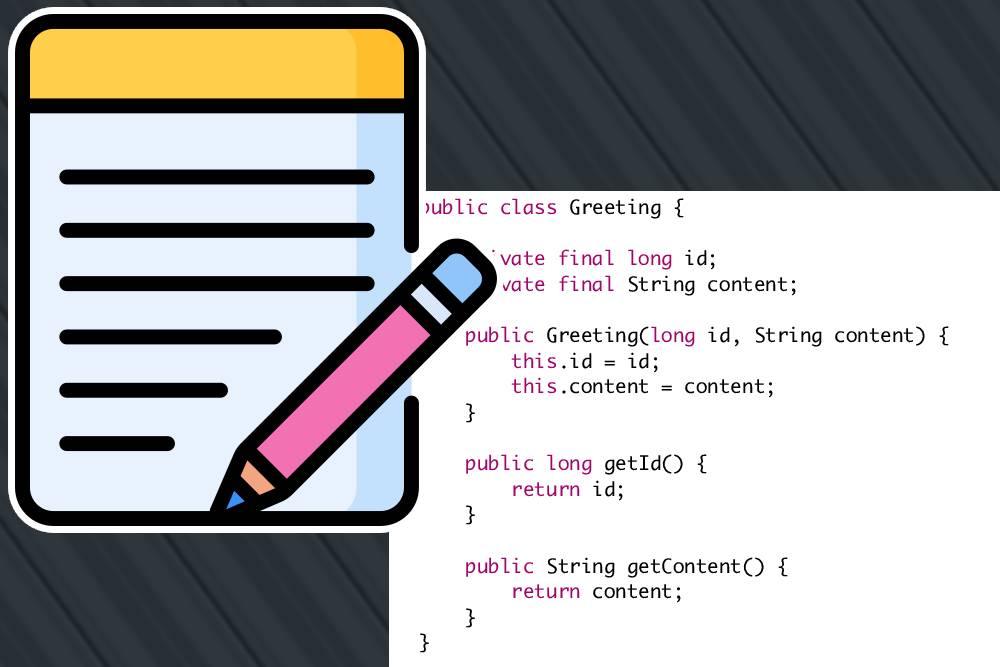
It makes no difference whether you’re a novice, intermediate, or advanced programmer. Every programmer’s journey into the niche begins with text editors. It is a necessary tool in the life of a programmer.
Text editors such as Notepad++, Sublime Text, Atom, Brackets, Visual Code, and others exist. To become an intelligent and productive developer, you’ll need to spend time learning text editors and keyboard shortcuts.
Here is the list of the best free code editors:
| Name | Link | Platform | Description |
| JSFiddle | https://jsfiddle.net/ | Online | All you can expect from a code editor is available in this 100% free online tool |
| Theia | https://theia-ide.org/ | Online | A more complicated version of JSFiddle who is looking for advanced functionality. |
| BBEdit Free | https://s3.amazonaws.com/BBSW-download/BBEdit_14.1.1.dmg | Mac OS | One of the best and easiest to use text editors that can be used completely free. |
| Notepad++ | https://notepad-plus-plus.org/downloads/ | Windows | The best and free code editor that has advanced functions such as search and replace in multiple files with regex. |
5. Testing basics
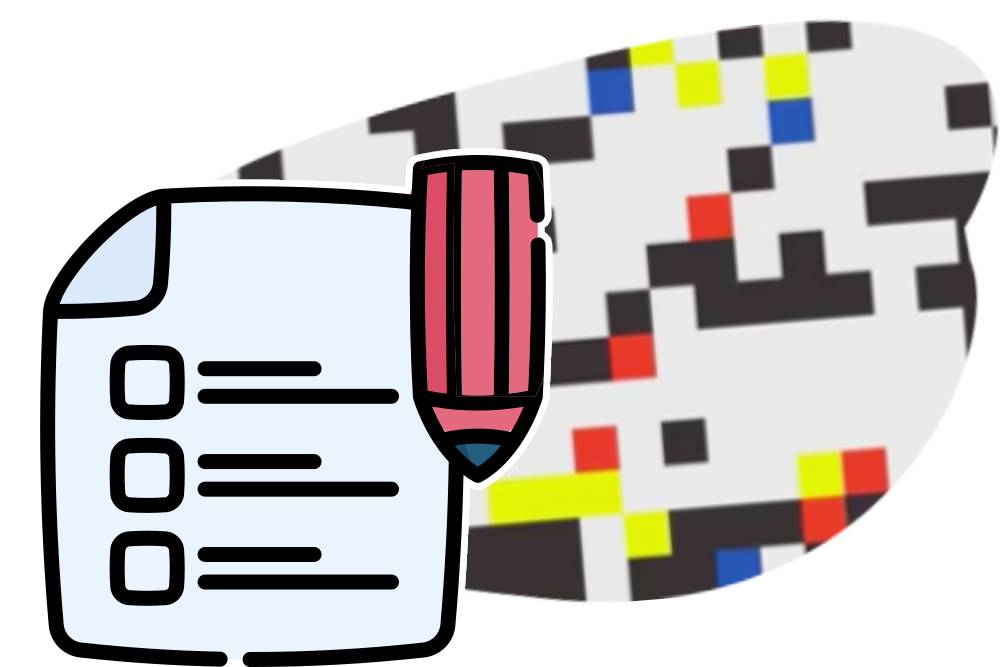
Testing is a crucial step in the software development process because it allows you to find bugs and determine whether the software is ready to be handed over to the customer.
There are numerous test cases that software or application must pass before being released to the market, but a developer should be familiar with at least three testing techniques:
The first is Unit Testing, which involves thoroughly testing each module or class. NUnit for C#, JUnit for Java, and Embunit for C or C++ are just a few of the many unit testing frameworks available.
Integration Testing is another type of testing in which a developer must test the interaction of various blocks or modules. This test aids in identifying data processing errors.
The third one is System Testing, which involves testing complete and integrated software. It’s a type of black-box testing that doesn’t require any internal knowledge of the code.
6. Computer networks
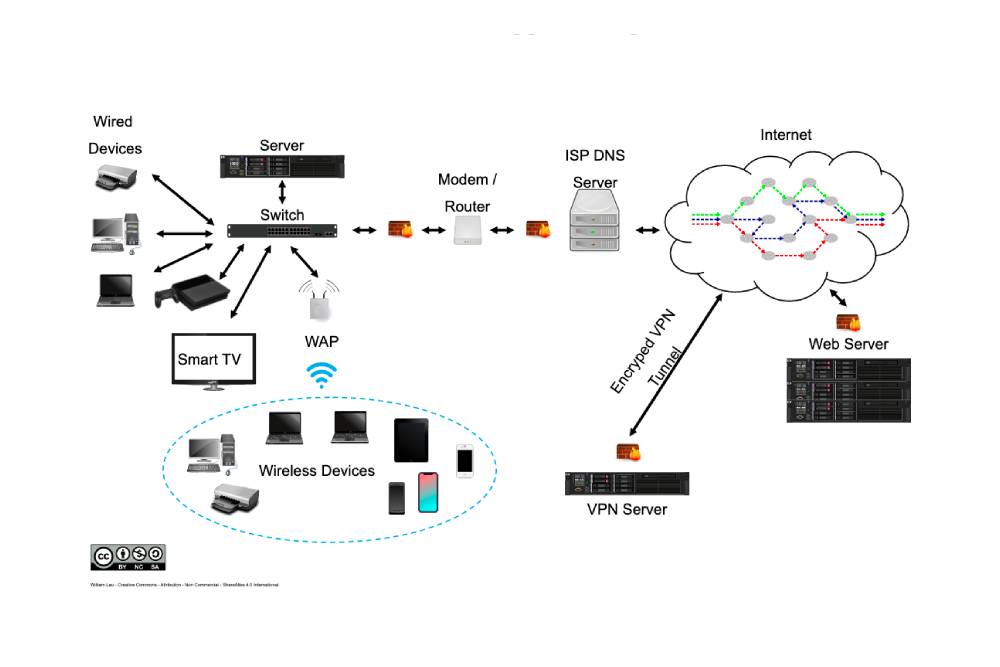
Today’s world is interconnected, and you’ll find computer networks everywhere, from your home, where you use wi-fi across multiple devices, to schools, colleges, and offices, where you use a Local Area Network (LAN) to connect to the Internet.
The majority of the applications you’ll write will be client-server applications, in which a request sends over the network to a server. Clients will be able to use your app from anywhere on the planet.
To summarize, you must understand networking fundamentals to comprehend, develop, and support your application.
7. Cryptography

To prevent external agents from learning information about a product, software developers frequently employ encryption techniques. One of them is cryptography, used for concealing confidential information by using an encryption code or password, commonly referred to as a key.
It entails creating a decryption code based on an algorithmic formula that can reveal the original data to a user. Symmetric encryption, which uses one key to unlock the original data, and asymmetric encryption, which uses two keys to unlock the original data, are the two main types of cryptography to learn.
8. Source control
A developer can use source control to manage and store their code. Most organizations are now looking for a developer who can work with other team members and use version control. So, if you want to be a good software developer, you should be familiar with version control concepts and tools such as Git, Mercurial, SVN, and others.
9. Software frameworks
A software framework is a tool that allows developers to build programs using previously created code or knowledge from other developers. Each operating system has its framework that includes the most popular programming languages. They may be predetermined structures and features that can speed up software development. For example, you can use the.NET framework on a Windows system while using Cocoa or Cocoa Touch on a Mac.
10. Operating systems
Operating systems are pieces of software that enable a program to run by configuring a device’s hardware. Microsoft Windows, macOS, and Linux are the most popular computer operating systems, while iOS and Android are the most popular mobile phone operating systems.
It may be beneficial for a software developer to learn the various types mentioned above to conduct better testing procedures and transfer lines of code between them. You can also specialize in developing program code for a single system, depending on your preferences and the job position requirements.
Where can you get software developer skills?
You can obtain software developer skills degrees and certificates by taking online courses, going to colleges, and attending coding bootcamps.
A coding bootcamp price is an affordable option for those seeking a career in programming.
Coding bootcamps are intensive courses that focus on web development, software design, mobile app development, IT security, and data science. They usually last for 12-20 weeks, though some can last up to 12 months, and draw technology professionals looking to improve their skills and career changers looking to learn new coding skills.
Coding bootcamps can be cheaper than four-year undergraduate programs, with a median cost of $13,580 in 2021. According to EducationData, the average four-year university undergraduate tuition and fees in 2020-21 was $35,331.
In short
This list may seem daunting, but it serves as a good starting point for IT newbies to understand the software developer skills to consider for further career success. If you’re looking for a programming job and want to pursue a career in software development, these are skills you can learn and improve to stay ahead of the pack.





